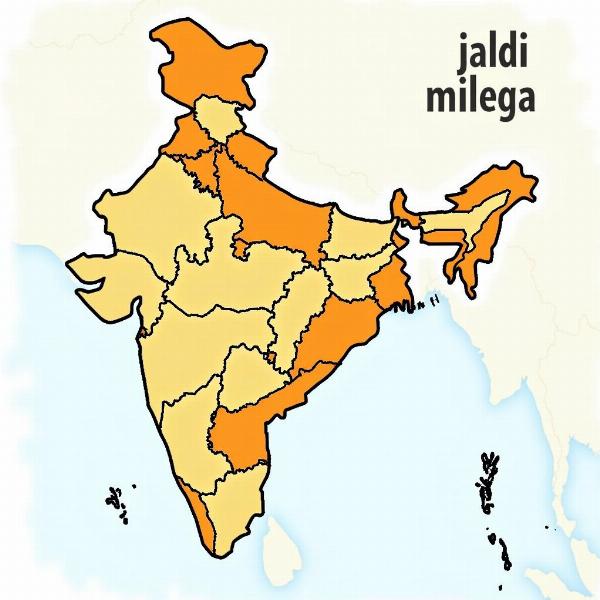Understanding the nuances of phrases like “you will get soon” can be tricky when navigating between English and Hindi. This guide will delve into the various ways to express this sentiment in Hindi, considering context, formality, and regional variations. We’ll explore the subtle differences between common translations and equip you with the perfect phrase for any situation.
Exploring the Nuances of “You Will Get Soon”
A direct translation of “you will get soon” often falls short of capturing the intended meaning. Hindi, being a rich and nuanced language, offers various options that convey the specific shade of meaning you desire. Are you assuring someone about receiving a physical object? Or perhaps offering comfort about an upcoming opportunity? The context significantly influences the appropriate Hindi phrase.
Common Hindi Translations and Their Usage
Several Hindi phrases can translate “you will get soon,” each with its unique connotations. Let’s examine a few:
- “Aapko jaldi milega” (आपको जल्दी मिलेगा): This is a formal and commonly used translation, suitable for most scenarios. It implies that the recipient will receive something relatively quickly.
- “Tumhe jaldi milega” (तुम्हें जल्दी मिलेगा): This is an informal version, used when addressing someone younger or close to you.
- “Jaldi hi prapt hoga” (जल्दी ही प्राप्त होगा): This is a more formal and literary translation, often used in written communication or formal speeches. It implies attainment or acquisition.
- “Thode hi der mein milega” (थोड़े ही देर में मिलेगा): This implies receiving something within a very short time frame.
- “Bas thoda intezaar karo” (बस थोड़ा इंतज़ार करो): This translates to “just wait a little bit” and is a more conversational way of conveying the message.
Choosing the Right Phrase for the Right Context
The most accurate Hindi translation depends heavily on the context. For instance, if you’re assuring a customer about a delivery, “aapko jaldi milega” or “aapko jaldi hi prapt hoga” are appropriate. When speaking to a friend about a future opportunity, “tumhe jaldi milega” or “bas thoda intezaar karo” would be more suitable.
Regional Variations and Dialects
Hindi spoken across India has regional variations and dialects, which can influence the preferred phrase. For example, in some regions, “jaldi” might be replaced with “shighra” (शीघ्र) for a more formal tone. Understanding these nuances can enhance communication and demonstrate cultural sensitivity.
 Regional Variations of "Jaldi Milega" in Hindi
Regional Variations of "Jaldi Milega" in Hindi
You Will Get Soon: Formal vs. Informal Hindi
The level of formality you want to convey is another critical factor. While “aapko jaldi milega” is generally acceptable in most formal situations, using “jaldi hi prapt hoga” adds an extra layer of respect and sophistication. Conversely, when speaking to family or friends, informal phrases like “tumhe jaldi milega” or even “bas thoda intezaar karo” are more appropriate.
“You Will Get Soon” in Common Situations: Examples
- At a restaurant: “Aapka order jaldi hi taiyaar ho jayega” (Your order will be ready soon).
- At a doctor’s office: “Aapko jaldi hi relief milega” (You will get relief soon).
- Among friends: “Arey, tension mat le, jaldi hi mil jayega” (Hey, don’t worry, you will get it soon).
Conclusion: Mastering “You Will Get Soon” in Hindi
Mastering the various ways to say “you will get soon” in Hindi allows you to communicate effectively and build stronger relationships. By considering the context, formality, and regional variations, you can choose the perfect phrase to convey your message accurately and respectfully. So, the next time you want to assure someone about receiving something or achieving a goal, you’ll have the right Hindi phrase at your fingertips!
FAQ:
- What is the most formal way to say “you will get soon” in Hindi? “Jaldi hi prapt hoga” (जल्दी ही प्राप्त होगा) is a formal and literary translation.
- How do you say “you will get soon” to a friend in Hindi? “Tumhe jaldi milega” (तुम्हें जल्दी मिलेगा) or “bas thoda intezaar karo” (बस थोड़ा इंतज़ार करो) are informal options.
- Does the meaning of “you will get soon” change based on the region in India? Yes, regional variations and dialects can influence the preferred phrase.
- What is the difference between “aapko jaldi milega” and “tumhe jaldi milega”? “Aapko” is formal, while “tumhe” is informal.
- Can I use “jaldi milega” in both formal and informal situations? While generally acceptable, consider using more formal or informal options depending on the context.
- Are there any other ways to express “you will get soon” in Hindi? Yes, phrases like “thode hi der mein milega” (थोड़े ही देर में मिलेगा) imply receiving something very soon.
- How important is it to consider context when translating “you will get soon” to Hindi? Context is crucial as it significantly influences the appropriate Hindi phrase.
Meaning-Hindi.in is your one-stop solution for all your Hindi translation needs. We offer a comprehensive suite of language services, from business and legal document translation to website localization and technical manual translation. Our team of expert linguists ensures accuracy, cultural sensitivity, and timely delivery. For all your translation requirements, contact us at [email protected] or call us at +91 11-4502-7584. Meaning-Hindi.in is committed to bridging the communication gap and helping you connect with your target audience effectively.